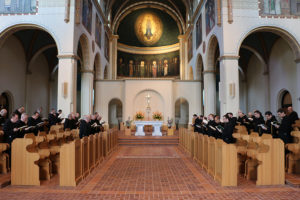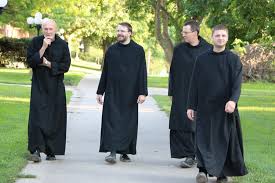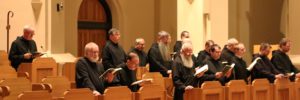This practical advice was written by Fr. Paul Sheller, OSB, Conception Abbey Vocation Director. To find out more about discerning religious life at Conception Abbey, visit their Monastic Vocations website or contact Fr. Paul, the Vocation Director.
- Take time for personal prayer
Prayer is the foundation to discern your vocation and deepening your relationship with Christ. You can listen best when you remove yourself from the things that distract us and compete for our attention (cell phones, the radio, computers, traffic, and other noise s) and place yourself in an environment of silence so as to listen to God. The time spent in silence may be difficult, or even uncomfortable at first, but perseverance is key. God speaks to you in the stillness of your heart. Do not be concerned with asking yourself “what should I do, or what should I be thinking,” but desire above all to be in God’s presence and allow God to be the one who acts.
s) and place yourself in an environment of silence so as to listen to God. The time spent in silence may be difficult, or even uncomfortable at first, but perseverance is key. God speaks to you in the stillness of your heart. Do not be concerned with asking yourself “what should I do, or what should I be thinking,” but desire above all to be in God’s presence and allow God to be the one who acts.
- Celebrate the Sacraments of Reconciliation and Eucharist
The Holy Spirit works powerfully when you approach the Sacrament of Reconciliation with humility and openness. Prepare for the Sacrament by making a good examination of conscience, and do not be afraid or embarrassed to confess your sins to a priest honestly. This is an opportunity to trust more in God’s mercy than in your own sinfulness. You should get into the practice of going to confession frequently, at least once a month.
 Certainly, you should be attending Mass every Sunday and on Holy Days of obligation, but it is very important for you to make an effort to attend Mass during the week when possible. Due to school and work schedules sometimes making it to daily Mass is not feasible. Whether you attend Mass during the week or not, you should take the time to prayerfully read and reflect on the Scripture readings from the day’s Mass. Christ speaks to us powerfully through the words of Sacred Scripture.
Certainly, you should be attending Mass every Sunday and on Holy Days of obligation, but it is very important for you to make an effort to attend Mass during the week when possible. Due to school and work schedules sometimes making it to daily Mass is not feasible. Whether you attend Mass during the week or not, you should take the time to prayerfully read and reflect on the Scripture readings from the day’s Mass. Christ speaks to us powerfully through the words of Sacred Scripture.
Discerning the action of the Holy Spirit is much easier with the help of a priest or religious who can give sound spiritual guidance. Discerning your own motivations is difficult alone, and God’s action comes to light when you are able to express your intentions aloud to someone experience in the spiritual life. The spiritual director’s primary role is to listen to the movement of grace in your life. The foundation of this relationship must be in trust and honesty. Whenever you place your trust in your spiritual director, it shows humility and a sincere desire to see clearly God’s will in your life.
- Contact the Vocation Director
Almost all monasteries and religious communities have someone appointed as the Vocation Director. The role of the Vocation Director is to help you further listen to what God is calling you, to answer your questions, and eventually discern whether or not you are being called to the community. Beginning the dialogue is important because it can help alleviate your fears and doubts. It is important to dialogue with the Vocation Director, especially since he or she is a professed religious who lives the joys and challenges of the particular way of life each and every day. Vocation Directors often ask important reflection questions that you may not have considered, which can be tremendously beneficial in your process of discernment. After talking with the Vocation Director, he or she may invite you to visit the community for a personal retreat or as part of a “Come and See” weekend experience.
- Visit the Religious Community that Attracts You
 Only so many questions can be answered on the Internet or addressed on the telephone, and at some point, you must experience firsthand the environment, encounter the community, and try the life (even if it is just for a weekend). Take the leap of faith, and do not be afraid to place your trust wholeheartedly in Christ. Before your visit, do not be weighed down with expectations of how you should feel or what you ought to experience. Simply be open and receptive to the Holy Spirit. It does not help to visit a community with an attitude that is closed off and says, “I’m just going so I can check this off of my list.” God’s grace is at work when you follow the Lord joyfully and cultivate praise and gratitude in your life.
Only so many questions can be answered on the Internet or addressed on the telephone, and at some point, you must experience firsthand the environment, encounter the community, and try the life (even if it is just for a weekend). Take the leap of faith, and do not be afraid to place your trust wholeheartedly in Christ. Before your visit, do not be weighed down with expectations of how you should feel or what you ought to experience. Simply be open and receptive to the Holy Spirit. It does not help to visit a community with an attitude that is closed off and says, “I’m just going so I can check this off of my list.” God’s grace is at work when you follow the Lord joyfully and cultivate praise and gratitude in your life.
Remember that there is no commitment or obligation when you initially explore religious life. It is a process of understanding how God is speaking to your heart. To explore your vocation is an exciting journey of faith!
